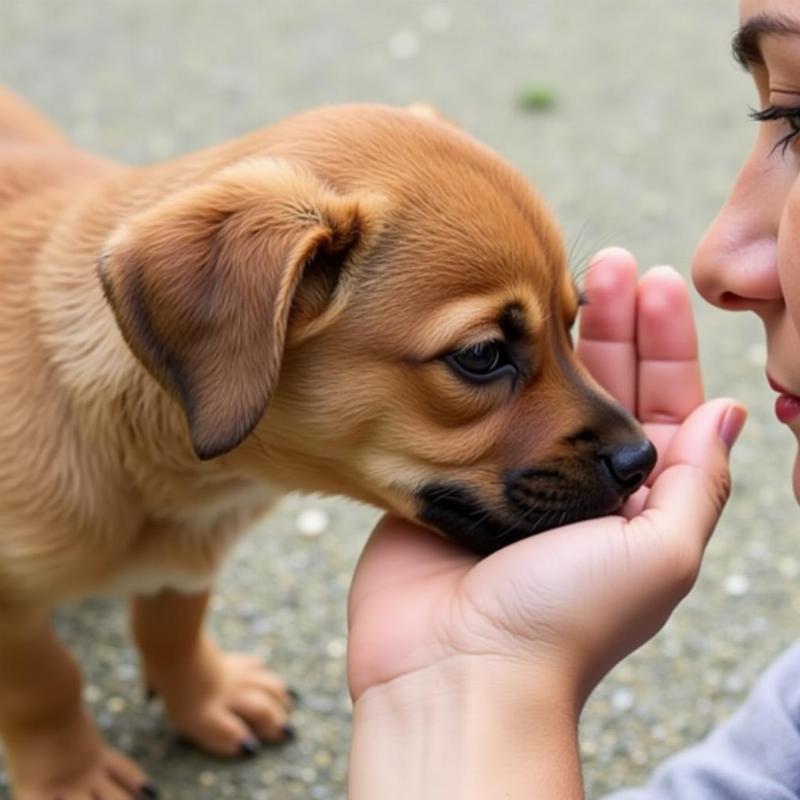Dog nibbling with front teeth can be endearing, puzzling, or even concerning for owners. Understanding why your canine companion engages in this behavior is key to ensuring their well-being and addressing any potential underlying issues. This comprehensive guide will explore the various reasons behind front teeth nibbling in dogs, offering insights into what it could mean and when it might warrant a visit to your veterinarian.
Decoding the Nibble: Why Does My Dog Nibble with Their Front Teeth?
There are several reasons why your dog might be nibbling with their front teeth. It could be a sign of affection, a playful gesture, or even a way to relieve stress. Let’s delve into the most common explanations:
- Grooming: Dogs often use their front teeth to groom themselves, removing loose hair or debris from their fur. This self-grooming behavior is perfectly normal and healthy.
- Affection: A gentle nibble on your hand or clothing can be a dog’s way of showing love and affection. It’s their version of a kiss or cuddle.
- Playfulness: During playtime, dogs may nibble as part of their interaction with you or other dogs. This type of nibbling is usually gentle and accompanied by other playful behaviors like tail wags and relaxed body language.
- Teething Puppies: Puppies, especially during the teething phase, experience discomfort and explore the world with their mouths. Nibbling on objects, including your hands, helps relieve the pressure on their gums.
- Anxiety or Stress: In some cases, excessive nibbling can be a sign of underlying anxiety or stress. Dogs may engage in this behavior as a coping mechanism.
- Medical Reasons: Less commonly, nibbling could indicate a medical issue like dental problems, skin allergies, or even neurological conditions.
Is My Dog’s Nibbling Normal? Identifying Potential Problems
While nibbling can be a harmless behavior, it’s important to distinguish between normal nibbling and potential problem signs. Consider the following:
- Intensity: Is the nibbling gentle or hard? Painful nibbling can indicate aggression or a behavioral issue.
- Frequency: How often does your dog nibble? Excessive nibbling might suggest an underlying problem.
- Context: When does the nibbling occur? Does it happen during specific situations like playtime, grooming, or when your dog is feeling anxious?
- Body Language: Observe your dog’s overall body language. Are they relaxed and happy, or do they appear tense and stressed?
 Chó con đang gặm nhấm tay chủ một cách vui đùa
Chó con đang gặm nhấm tay chủ một cách vui đùa
Addressing Excessive Nibbling: Tips and Strategies
If your dog’s nibbling becomes excessive or problematic, there are several strategies you can employ:
- Redirect the Behavior: Offer your dog appropriate chew toys or treats to redirect their nibbling behavior.
- Positive Reinforcement: Reward your dog when they exhibit desirable behaviors, such as chewing on their toys instead of nibbling on you.
- Training and Socialization: Proper training and socialization can help address underlying anxiety or behavioral issues that may contribute to excessive nibbling.
- Veterinary Check-up: If the nibbling persists or is accompanied by other concerning symptoms, consult your veterinarian to rule out any underlying medical conditions.
When to Seek Professional Help
It’s crucial to seek professional veterinary advice if your dog’s nibbling:
- Causes pain or injury.
- Is accompanied by other behavioral changes, like aggression or fearfulness.
- Becomes obsessive or compulsive.
- Is associated with any other health issues.
Conclusion: Understanding Your Nibbling Companion
Understanding the reasons behind your dog’s front teeth nibbling can strengthen your bond and ensure their well-being. By observing their behavior, providing appropriate outlets, and seeking professional help when needed, you can address this behavior effectively and enjoy a harmonious relationship with your furry friend.
FAQs:
- Why does my puppy nibble on everything? Puppies explore the world with their mouths, especially during teething.
- Is it okay to let my dog nibble on my hands? Gentle nibbling can be a sign of affection, but it’s important to set boundaries and discourage hard biting.
- How can I stop my dog from nibbling on my clothes? Redirect their attention with toys and reward good behavior.
- Could nibbling be a sign of a medical problem? In some cases, yes. Consult your veterinarian if you’re concerned.
- What are some good chew toys for my dog? Choose toys that are durable, appropriately sized, and made of safe materials.
- How can I tell if my dog’s nibbling is playful or aggressive? Observe their body language. Playful nibbling is usually gentle and accompanied by relaxed postures.
- When should I be concerned about my dog’s nibbling? Seek professional help if the nibbling causes pain, becomes excessive, or is accompanied by other behavioral changes.
Beautdogs.us: Your Trusted Source for Dog Care
Beautdogs.us is the leading online destination for American dog owners seeking reliable and comprehensive information on dog care, breed specifics, and products. We offer expert advice on everything from puppy training to senior dog care, empowering you to provide the best possible care for your furry companion. Whether you’re a new dog owner or a seasoned expert, Beautdogs.us is your go-to resource. Contact us today for personalized advice and support! Email: [email protected], Phone: +1 501-555-7529.